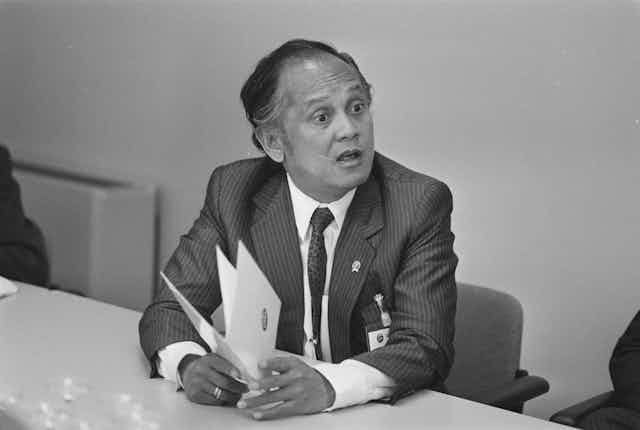Former Indonesian president Bacharuddin Jusuf Habibie, who passed away on Wednesday in Jakarta at the age of 83, ushered in democratic reforms in his short period as president. But his longest-serving role was as minister of research and technology. There is no doubt the brilliant aircraft engineer was the best research minister Indonesia ever had.
Appointed minister of research and technology in 1978, Habibie had a clear strategy for how Indonesia should use science and technology to develop the nation. During his 20-year tenure as minister, he developed high-technology industries, such as aircraft manufacturing, supported science-driven biotechnology research (my area of work), sponsored thousands of young people for science fellowships abroad, and used his power to cut the stifling red tape that hampers scientific research.
He has inspired generations of Indonesians. Through his work, he changed many lives, including mine.
Biotechnology as a national priority
In 1990, I was leading a research lab on molecular biology at Monash University in Melbourne when a fax with a letterhead of Indonesia’s coat of arms, the mythical Garuda bird, came in. It was from Habibie. He asked me to return home to help develop research in biotechnology.
In those days it was becoming clear, with the advances in molecular biology such as the development of DNA sequencing and cloning, that biotechnology would be the basis of an industrial revolution in medicine, agriculture and many other things.
Habibie, who was developing Indonesia’s aircraft industries at the time, noticed the important scientific revolution that was happening in the field of molecular biology, one far from his own. This is a testament to his visionary thinking as the country’s minister of research and technology.
It was not an easy decision to return to Indonesia. I had been doing research in Australia for 20 years, producing groundbreaking findings on mitochondrial DNA mutations related to disease and ageing. I had Indonesian PhD students working at my lab in Melbourne, and I believed I could serve the country better through my work there.
Sitting in the minister’s office in Jakarta with all the models of aeroplanes on the table, he didn’t need me to tell him that biotechnology was the future. He understood it as much as I did.
I reminded him that the then defunct Research Laboratory for Pathology and Bacteriology, where Christiaan Eijkman worked on his Nobel Prize-winning findings on the relationship between vitamin B1 deficiency and beri-beri, was about to celebrate its 100-year anniversary.
I hadn’t finished my sentence suggesting reopening the institute, when he put his fist on the table and exclaimed: “That’s the way to do it. We should revive the institute!”
That immediate chemistry that we had and the challenge to reopen an institute that has a long historical legacy convinced me to return home. I led the institute for 22 years until 2014, and it has contributed to the development of science in the areas of human genetics, infectious diseases and genetic biodiversity.
The Eijkman Institute is only one of three biotechnology research centres he established. One that focused on agriculture was placed under the research centre at the Agriculture Ministry, and one that linked directly to industries was established under the Centre for Research, Science and Technology (Puspiptek).
Habibie’s support for biotechnology research spurred the opening of biotechnology courses in Indonesian universities.
He also established the Centre for Research, Science and Technology (Puspiptek), a science park that serves as a hub for scientific research. This visionary initiative inspired countries like Thailand and Malaysia to do the same, contributing to the development of science and research in the region.
Ahead of his time
Habibie was frequently misunderstood, but it was because he was too far ahead of his time in terms of his vision compared to the rest of Indonesia.
He was criticised when he sent young Indonesians, from high school graduates to postdoctoral researchers, on scientific fellowships abroad. Now, it’s common knowledge that exposure to international research will enrich the nation. But back during his time as minister of research, people questioned this program.
When we revived the Eijkman Institute, people also criticised naming the research centre after a Dutch scientist. But he understood that naming it after the Nobel-prize-winning scientist was important to send a signal to the world that Indonesia was determined to build on the legacy of Eijkman’s important work.
Habibie overcame his detractors by being consistent in his work to advance Indonesia’s research and technology sector. He was not afraid to cut red tape to allow research institutes that he established to develop without the bureaucratic hurdles that government agencies had to go through.
Inspiration for the young generation of scientists
As Indonesians receive the news of Habibie’s passing, homage for the beloved former president has flooded our social media timelines. I received one from Sudirman Nasir, a talented public health researcher from South Sulawesi, where Habibie also originated. In his message, Sudirman shared that as a child whenever an aeroplane flew over his small town, he and his friends would run and point to the aeroplane shouting that it’s Habibie’s plane.
Read more: As Indonesia marks 70 years of independence, young scientists look ahead to the 100th
Sudirman became one of the authors of the book Science 45: An Indonesian Science Agenda Towards a Century of Independence, produced by the Young Indonesia Academy of Science. Habibie hosted the launch of this book at his home in 2015. Sudirman wrote that, at the time, he could not believe his eyes seeing his idol in front of him. Such is the inspiration Habibie generates in others.
With limited resources but a clear vision, Habibie had dared to dream big and introduced innovative approaches to support the research sector. Now it’s up to us to keep his legacies alive.

The Indonesian Academy of Sciences supports The Conversation Indonesia as host partner.


